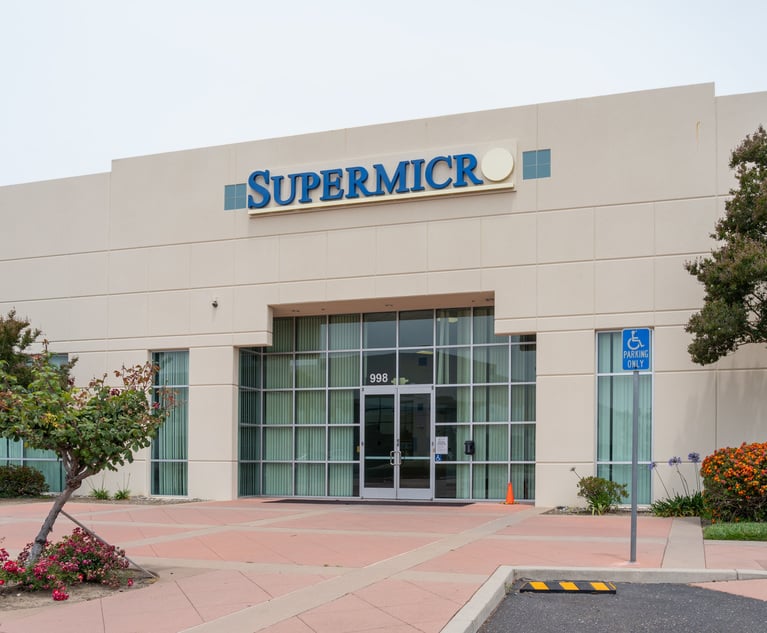Tech Litigation Department of the Year Finalist: Orrick
"Our guidepost is whether we achieved our client's objective, however the client defines it," says Orrick's Jessica Perry.
October 31, 2019 at 12:30 PM
4 minute read
 (L to R) Jessica Perry, Jim Kramer, Lynne Hermle and Jared Bobrow of Orrick, Herrington & Sutcliffe.
(L to R) Jessica Perry, Jim Kramer, Lynne Hermle and Jared Bobrow of Orrick, Herrington & Sutcliffe.
Orrick, Herrington & Sutcliffe partners Lynne Hermle and Jessica Perry led litigation teams that fought off class certification for Twitter and Microsoft in two of the most closely watched gender pay disparity cases in the tech industry. Partner Jim Kramer defended PayPal from a pair of shareholder class actions. And patent litigators Jared Bobrow and Jason Lang won affirmance of Patent Trial and Appeal Board victories for Micron Technology at the Federal Circuit.
That resume landed Orrick as one of six finalists for the Tech Litigation Department of the Year as part of The Recorder's California Leaders in Tech Law and Innovation Awards. The winner will be announced at a ceremony celebrating all winners and finalists Nov. 6. The Recorder recently asked Perry, the leader of Orrick's litigation practice worldwide, how the firm is managing changing trends in litigation.
The Recorder: When a client comes to Orrick for representation on a piece of litigation, what can they expect?
Jessica Perry: We're going to invest our time in listening to your goals, learning about your business and the problem you are facing, and work together with you to define a path to achieve your objective. Our clients today have incredibly talented in-house teams. Getting to the best result is a collaborative process. This includes talking with you about how you want to invest your budget for the matter. We'll also talk about ways we can bring analytics, project management and new kinds of legal professionals to the table to improve quality and efficiency.
You can also expect to work with a team that is fun and inclusive. Our clients and we all work incredibly hard, in a profession that is high-stress. We're fortunate to do it with great people, and we make sure we focus on that, too.
How does your firm gauge success on any particular litigation matter?
Our guidepost is whether we achieved our client's objective, however the client defines it.
What ways is the business of litigation changing, and how are you adapting to those changes?
I'd point to three fundamental changes:
First, with the growth of in-house teams, the rise of alternative providers and more sophisticated metrics, clients have many more options for how they staff their docket. We've responded by focusing on more complex matters where we can bring something distinctive and valuable to the problem.
Second, there's a clear recognition by clients of the value of trial teams that look like their customers and to whom juries and judges can relate. So, one of the most exciting developments is greater opportunity for diverse and female litigators to lead. Many of our clients are taking an active role with us in developing talent. In fact, one client recently worked with us to put on a trial school for the next generation of litigation talent, including diverse talent.
Third, innovation has come to litigation. This includes new technologies and platforms, new processes and new roles. We have a team of litigation professionals, from project managers to statisticians, who are able to take tasks off of the plates of the trial team while generating data that is informing case strategy. They're also focused on continual process improvement. For example, this year we rolled out a custom-built solution to manage privilege review to save our clients hundreds of hours of human review and tens of thousands of dollars. We've created new processes and matter management tools to handle complex dockets, multiple firms and witnesses, and millions of documents. This is an area that is changing incredibly fast, so we recently developed a "social network" to actively track over 600 emerging legal technologies and share feedback on what's most effective.
This content has been archived. It is available through our partners, LexisNexis® and Bloomberg Law.
To view this content, please continue to their sites.
Not a Lexis Subscriber?
Subscribe Now
Not a Bloomberg Law Subscriber?
Subscribe Now
NOT FOR REPRINT
© 2025 ALM Global, LLC, All Rights Reserved. Request academic re-use from www.copyright.com. All other uses, submit a request to [email protected]. For more information visit Asset & Logo Licensing.
You Might Like
View All

Zoom Faces Intellectual Property Suit Over AI-Based Augmented Video Conferencing
3 minute read
'A Warning Shot to Board Rooms': DOJ Decision to Fight $14B Tech Merger May Be Bad Omen for Industry

California Walnut Grower and German Investment Firm Vie for Lead Plaintiff Status in Super Micro Securities Action
Trending Stories
- 1Public Notices/Calendars
- 2Wednesday Newspaper
- 3Decision of the Day: Qui Tam Relators Do Not Plausibly Claim Firm Avoided Tax Obligations Through Visa Applications, Circuit Finds
- 4Judicial Ethics Opinion 24-116
- 5Big Law Firms Sheppard Mullin, Morgan Lewis and Baker Botts Add Partners in Houston
Who Got The Work
J. Brugh Lower of Gibbons has entered an appearance for industrial equipment supplier Devco Corporation in a pending trademark infringement lawsuit. The suit, accusing the defendant of selling knock-off Graco products, was filed Dec. 18 in New Jersey District Court by Rivkin Radler on behalf of Graco Inc. and Graco Minnesota. The case, assigned to U.S. District Judge Zahid N. Quraishi, is 3:24-cv-11294, Graco Inc. et al v. Devco Corporation.
Who Got The Work
Rebecca Maller-Stein and Kent A. Yalowitz of Arnold & Porter Kaye Scholer have entered their appearances for Hanaco Venture Capital and its executives, Lior Prosor and David Frankel, in a pending securities lawsuit. The action, filed on Dec. 24 in New York Southern District Court by Zell, Aron & Co. on behalf of Goldeneye Advisors, accuses the defendants of negligently and fraudulently managing the plaintiff's $1 million investment. The case, assigned to U.S. District Judge Vernon S. Broderick, is 1:24-cv-09918, Goldeneye Advisors, LLC v. Hanaco Venture Capital, Ltd. et al.
Who Got The Work
Attorneys from A&O Shearman has stepped in as defense counsel for Toronto-Dominion Bank and other defendants in a pending securities class action. The suit, filed Dec. 11 in New York Southern District Court by Bleichmar Fonti & Auld, accuses the defendants of concealing the bank's 'pervasive' deficiencies in regards to its compliance with the Bank Secrecy Act and the quality of its anti-money laundering controls. The case, assigned to U.S. District Judge Arun Subramanian, is 1:24-cv-09445, Gonzalez v. The Toronto-Dominion Bank et al.
Who Got The Work
Crown Castle International, a Pennsylvania company providing shared communications infrastructure, has turned to Luke D. Wolf of Gordon Rees Scully Mansukhani to fend off a pending breach-of-contract lawsuit. The court action, filed Nov. 25 in Michigan Eastern District Court by Hooper Hathaway PC on behalf of The Town Residences LLC, accuses Crown Castle of failing to transfer approximately $30,000 in utility payments from T-Mobile in breach of a roof-top lease and assignment agreement. The case, assigned to U.S. District Judge Susan K. Declercq, is 2:24-cv-13131, The Town Residences LLC v. T-Mobile US, Inc. et al.
Who Got The Work
Wilfred P. Coronato and Daniel M. Schwartz of McCarter & English have stepped in as defense counsel to Electrolux Home Products Inc. in a pending product liability lawsuit. The court action, filed Nov. 26 in New York Eastern District Court by Poulos Lopiccolo PC and Nagel Rice LLP on behalf of David Stern, alleges that the defendant's refrigerators’ drawers and shelving repeatedly break and fall apart within months after purchase. The case, assigned to U.S. District Judge Joan M. Azrack, is 2:24-cv-08204, Stern v. Electrolux Home Products, Inc.
Featured Firms
Law Offices of Gary Martin Hays & Associates, P.C.
(470) 294-1674
Law Offices of Mark E. Salomone
(857) 444-6468
Smith & Hassler
(713) 739-1250






